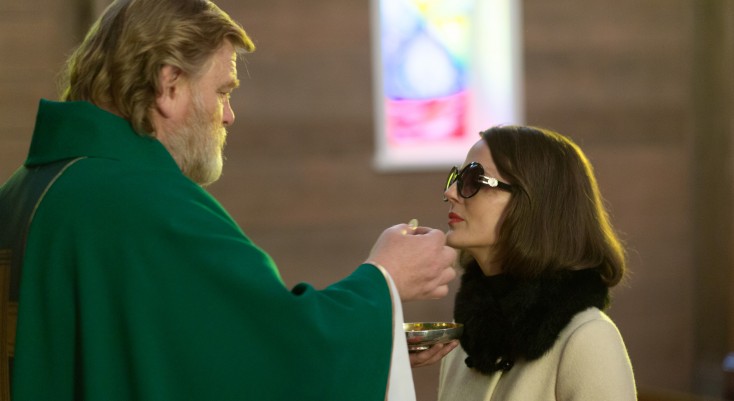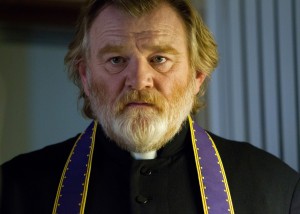By ANGELA DAWSON
Front Row Features
HOLLYWOOD—Brendan Gleeson plays an Irish Catholic priest in “Calvary,” but he likens his character to that of a samurai warrior rather than a messenger of God.
The internationally acclaimed actor, best known for his roles in “Braveheart” and “In Bruges,” reunites with “The Guard” writer/director John Michael McDonagh in this drama with elements of dark humor set in a remote Irish village. Gleeson, 59, plays a genial parish priest who receives a confession from an anonymous congregant who threatens to kill him for the abuse he sustained from another priest as a child. As he goes about his duties over the next seven days, Gleeson’s Father James tries to figure out the identity of his would be assassin. Meantime, his estranged daughter (Kelly Reilly) from a marriage he had prior to taking his priestly vows arrives in town and he tries to reestablish a relationship with her.
Gleeson, who also is known to movie audiences as Mad Eye Moody from three of the “Harry Potter” films, recently spoke about reuniting with McDonagh, playing a priest, his mentors and his rock (his wife of 32 years, Mary Gleeson).
Q: When you read the script, what was your first reaction?
Gleeson: I felt obviously challenged about it but in an odd way I felt reassured that what we had talked about was more or less on the page, and more besides. I had an initial kind of feeling that I knew this man now as a human being through the daughter, which I wasn’t expecting. Well, I was. John kind of signaled it to me. I thought maybe we should see more of that. But ultimately, I knew him as a man through the daughter, and then his vocation was clear. I was not delayed by it; I felt excited and all that. But it was onerous enough I suppose heading into it. But I didn’t really that way. I felt I understood, culturally, where he was coming from. I understood the issues. There was a lot of stuff that was second nature and it was a very recognizable context for me.
Q: Did you see Father James as an allegory for Christ?
Gleeson: No. I never felt Christ-like. I felt like a samurai warrior more than Christ really, in the sense that he was the protector of whatever the essence of goodness is. It felt like when I put on the vestments for mass that was kind of his armor. There’s a picture of the sacred heart that I kind of remember thinking about where you see the actual heart. It’s open there for anybody to have a go at. That’s it. So in one way, it felt like I had on a suit of armor, and in another way I felt like I was stripping everything away. It was a very odd sensation. But I don’t think it was an allegory for Christ. I think “Calvary” certain has its reference points. Initially, John started talking about the Stations of the Cross but he dismissed it pretty quickly because there are too many of them ultimately, in terms of the schematic nature of the film. As he has said, we would have had a three-hour Lars von Trier movie. (He laughs.) That was his comment, not mine. But the notion of atoning for others pain and for others sins too in terms of the abuse that’s been perpetrated by people of the cloth, and absorbing people’s pain and trauma and taking them on himself, that was Christ-like, but like I say, Christ knew who his father was. Father James is kind of working on his own faith that this is actually a good idea.
Q: Do you and John Michael McDonagh have a shorthand now that you’ve worked on two films together?
Gleeson: No, I explore what he needs from me. He’s such an exquisite writer and he has such a sure cinematic vision that I feel really liberated in what I find in the character. We don’t always agree on things. But we share instincts in most areas. We have enough to disagree about to create a proper creative friction. I tend to be more optimistic; he tends to be more nihilistic. He keeps writing about his own nihilism, but then he writes these exquisitely tender scenes that are full of compassion and love. So I know they’re there, and he knows I know they’re there.
Q: Had you played a priest before?
Gleeson: I played Father Bubbles in “The Butcher Boy,” who Francie Brady makes an idiot of, really. That was probably my favorite novel at the time ever, or one of them. So to play that guy was interesting—Neil Jordan’s (adapted screenplay of) “The Butcher Boy.” He was a good priest too. He was a little naïve, though. This guy (in “Calvary”) is not naïve, which is more interesting to me.
Q: Is there a certain responsibility in playing a priest?
Gleeson: There was, yeah, but I’ve decided not to say what my own spiritual convictions are, because I want people to be able to watch the film without thinking there is any particular agenda going on with regard to faith or no faith or Catholic or non-Catholic. I’m not being coy. I just don’t think it’s a good idea for me to go into my own idea. But, certainly there were people in my childhood, and (this script) kept bringing me back to that.
Q: Like whom?
Gleeson: There was a guy who was a mentor of mine, a Christian brother in an order that got a lot of abuse, and justifiably so. They were kind of past their sell-by date. But he was a hugely inspirational figure at my primary school. Also, my parents’ faith was the one that I accessed more than anything more modern. I found that there was a clarity of purpose there. Before people had the kind of questioning that has been the norm for the last 30-40 years, there was a kind of a faith and humility and charity that I missed when it started to move on. It was unearned kindness, just the ability to go to a child if they’re lost and help them. The scene (in the film) where I talk to the little girl and her father drives up and makes her get into the car, worried what I’m going to do, resonated with me a huge amount. You can’t even talk to a girl on the road without risking being accused of something improper. I have four sons. They are a massive thing in my life, and my greatest gift. But you can’t take a lost child’s hand in the supermarket and bring him over to his mother anymore without making sure somebody else is around. I mean, there’s something broken.
Q: Do you build an inner life for the characters you play?
Gleeson: It depends. I don’t a particular process. Whatever I need to do is what I’m going to do. I don’t necessarily do Method (acting), but I don’t mind if somebody else is doing it. It’s kind of great to jump in and improvise and do all that stuff around the work. I can read a script. That may be one of the things that has stayed with me from having read all those essays when I was a teacher. (He was a teacher until age 34.) I can empathize with characters while I’m reading a script to the extent that I can feel impact or I can feel a lack of it. It’s been an important thing in my arsenal. I’ve been able to distinguish pretty well between what’s a good script and what isn’t. By the time you get (to set), you’ve already read the script in your voice in your head, and that’s really the beginning of empathizing with whatever the character is. Then you do whatever you need to for research. I played Churchill, for example, which was a massive leap for me in terms of accent and culture. It was totally different from my life experience. So with that I had to do a lot of research. Other times I find research gets in the way. I approach every job in the way that it needs to get done. (Actor) John Hurt said something about doing accents that always resonated with me. He said, “An accent has to be part of your DNA. It’s not a suit or clothes you’re putting on. It has to be much deeper than that.” I feel that all research has to be part of that nature.
Q: You’re a father and husband, and you have a successful career. How do you juggle everything?
Gleeson: I’m lucky to have an extraordinary partner. She’s walked the hard yards for me in a lot of cases, particularly in the raising of the children. They already were a fact when I went full time. We decided to have the base of home in Dublin, as the mothership. There were sacrifices involved. They didn’t get hauled around to places. I got lonely but I knew the kids were being looked after. I was very lucky. I think it’s very difficult when a couple has two careers to balance. It was much more difficult than I had. I have her to thank for that, I guess.






